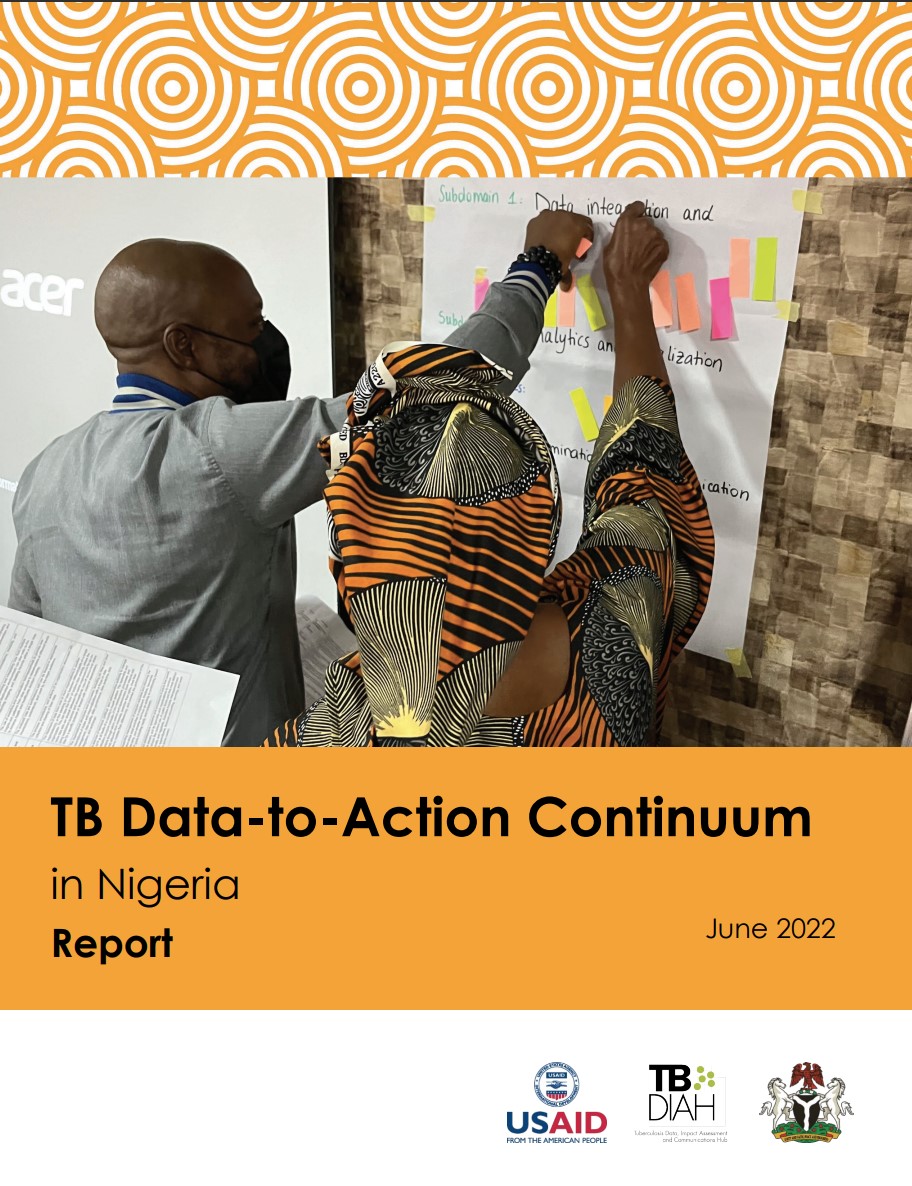TB Data-to-Action Continuum in Nigeria

Citation: Chauffour, J., Hassan, A. O., Kuye, J., Ohikhuai, C., Udah, D. (2022). TB Data-to-Action Continuum in Nigeria: Report. Chapel Hill, NC, USA: TB DIAH, University of North Carolina.
Abstract: A strong tuberculosis (TB) monitoring and evaluation (M&E) and surveillance system is a vital tool for countries to reach global goals to end TB. The United States Agency for International Development (USAID) leads the U.S. Government’s global efforts to end TB. USAID’s Global Accelerator to End TB is the Agency’s programmatic approach to fight TB. Under the Accelerator, USAID funds the TB Data, Impact Assessment and Communications Hub (TB DIAH) project, which developed a TB Data-to-Action Continuum (D2AC) Toolkit to measure countries’ progress and guide efforts to improve their TB M&E and surveillance systems.
Nigeria was selected as the second field test location for the D2AC workshop. The workshop was held in April 2022 in Abuja. Forty-one participants attended, representing all levels of the Nigeria health system and other TB stakeholder groups. The D2AC workshop was conducted in person. The D2AC team applied a mixed methods approach conducted in three parts with the support of the D2AC Toolkit: (1) participants first completed the D2AC Toolkit’s data collection instrument individually and then in groups; (2) individually and then in groups, participants provided evidence and justification in the data collection instrument for the response options selected; and (3) in groups, participants identified priority actions for post-workshop implementation. A semi-structured questionnaire and focus group discussion method were implemented during the assessment.
The D2AC assessment in Nigeria shed light on the perceived weaknesses of the Nigeria TB system, primarily in the domain of information and communications technology (ICT), where hardware, network and connectivity, and ICT business infrastructure received the lowest scores across the groups, on average. Beyond the challenges around physical resources, equipment, and infrastructure, other challenges identified related to improvements that could be made concerning data management and use practices, functionalities, and capabilities, specifically: data integration, data exchange and interoperability, and data access and sharing. The D2AC assessment in Nigeria also shed light on the areas of the D2AC scale that were performing the strongest. They included aspects of data availability practices, such as data reporting, data quality, and data dissemination and communication. Another strong area was monitoring, evaluation, and learning (MEL). These areas received scores superior to 4 out of 5, meaning that they were at an “institutionalized” stage of the continuum.
This report shares more on the workshop and recommendations.
Nigeria was selected as the second field test location for the D2AC workshop. The workshop was held in April 2022 in Abuja. Forty-one participants attended, representing all levels of the Nigeria health system and other TB stakeholder groups. The D2AC workshop was conducted in person. The D2AC team applied a mixed methods approach conducted in three parts with the support of the D2AC Toolkit: (1) participants first completed the D2AC Toolkit’s data collection instrument individually and then in groups; (2) individually and then in groups, participants provided evidence and justification in the data collection instrument for the response options selected; and (3) in groups, participants identified priority actions for post-workshop implementation. A semi-structured questionnaire and focus group discussion method were implemented during the assessment.
The D2AC assessment in Nigeria shed light on the perceived weaknesses of the Nigeria TB system, primarily in the domain of information and communications technology (ICT), where hardware, network and connectivity, and ICT business infrastructure received the lowest scores across the groups, on average. Beyond the challenges around physical resources, equipment, and infrastructure, other challenges identified related to improvements that could be made concerning data management and use practices, functionalities, and capabilities, specifically: data integration, data exchange and interoperability, and data access and sharing. The D2AC assessment in Nigeria also shed light on the areas of the D2AC scale that were performing the strongest. They included aspects of data availability practices, such as data reporting, data quality, and data dissemination and communication. Another strong area was monitoring, evaluation, and learning (MEL). These areas received scores superior to 4 out of 5, meaning that they were at an “institutionalized” stage of the continuum.
This report shares more on the workshop and recommendations.
Shortname: TR-22-481-TB
Author(s): Jeanne Chauffour, MS; Abiodun Olusegun Hassan, MBBS, MPH; Joseph Kuye, MD; Charles Ohikhuai, MPH; Donald Udah, MSc
Year: 2022
Language: English
Region(s): NIGERIA
Resource Type: Reports
Source: TB DIAH
